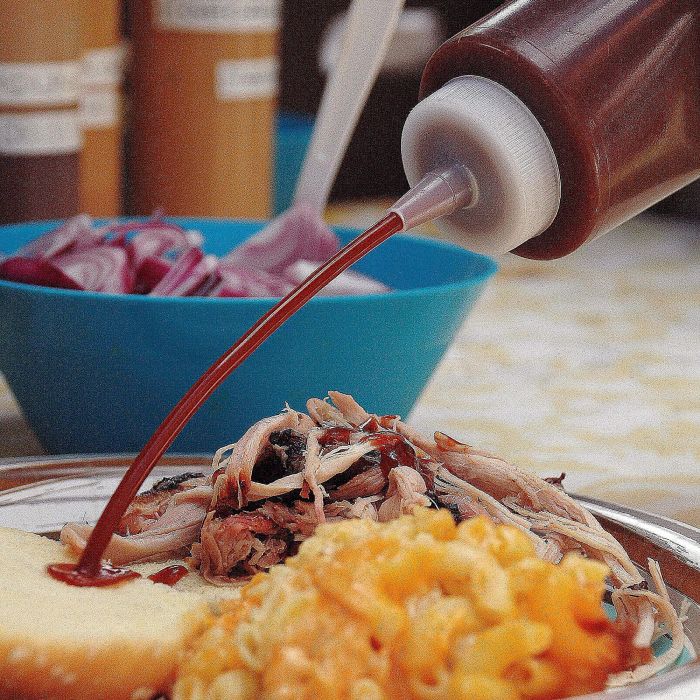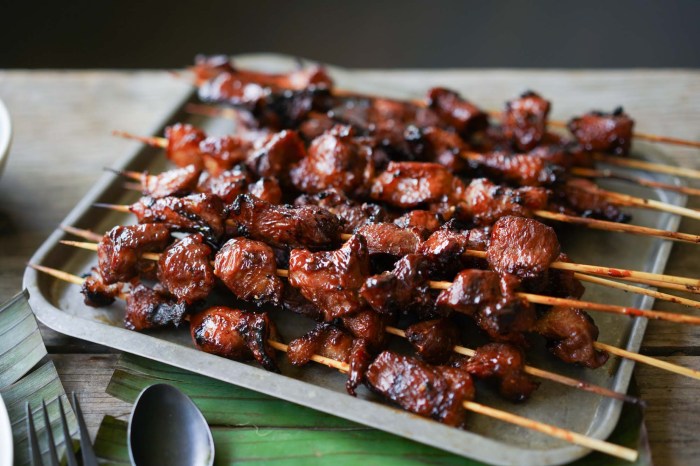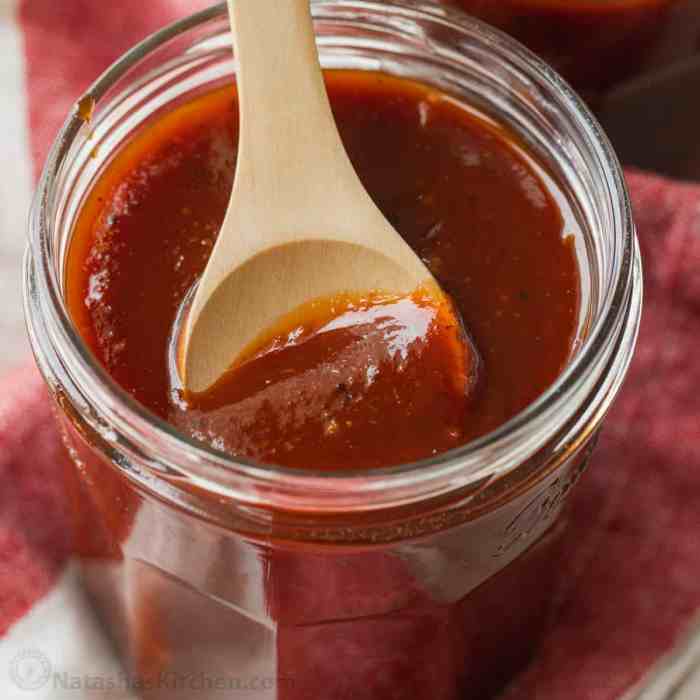Barbecue Sauces for Pork: A Comprehensive Guide
Barbecue sauce recipes for pork – Barbecue sauce, a cornerstone of American cuisine, boasts a rich history and diverse regional variations. Its evolution reflects the melting pot of cultures that shaped the nation, with influences ranging from Indigenous cooking techniques to European settlers’ ingredients and methods. This guide explores the world of pork barbecue sauces, delving into their history, types, recipes, and techniques to help you create mouthwatering masterpieces.
Introduction to Barbecue Sauces for Pork

Source: thespruceeats.com
Barbecue sauce, far from a simple condiment, is a complex blend of flavors that elevates pork to new heights. Its history traces back centuries, evolving from simple vinegar-based sauces to the richly complex variations we know today. A good pork barbecue sauce balances sweet, smoky, and savory notes, creating a harmonious flavor profile that complements the richness of the meat.
The interplay of these flavors is crucial; an excess of sweetness can overwhelm the pork, while a lack of smokiness can leave the sauce feeling one-dimensional.
Types of Barbecue Sauces for Pork

Source: hungryhuy.com
The United States alone boasts a plethora of regional barbecue sauce styles, each with its unique character. From the tangy vinegar-based sauces of the Carolinas to the sweet and thick concoctions of Kansas City, the variations are vast and reflect local culinary traditions and ingredient availability. These differences are often tied to the type of pork being cooked and the preferred cooking method.
| Sauce Name | Region of Origin | Key Ingredients | Flavor Profile |
|---|---|---|---|
| Carolina Vinegar Sauce | North Carolina | Vinegar, black pepper, red pepper flakes | Tangy, spicy, vinegary |
| Kansas City Sweet Sauce | Kansas City, Missouri | Tomato, brown sugar, molasses, vinegar, spices | Sweet, tangy, smoky |
| Memphis Dry Rub | Memphis, Tennessee | Brown sugar, paprika, chili powder, garlic powder, onion powder | Savory, smoky, slightly sweet |
| Alabama White Sauce | Alabama | Mayonnaise, vinegar, horseradish, black pepper | Tangy, creamy, slightly spicy |
| Texas-Style Mop Sauce | Texas | Vinegar, Worcestershire sauce, spices | Savory, tangy, slightly sweet |
The regional differences are not just about taste; they also reflect the methods used to prepare the pork. For instance, the thin, vinegar-based sauces of the Carolinas are often used with pulled pork cooked low and slow, while the thicker, sweeter sauces of Kansas City are frequently paired with ribs.
Basic Barbecue Sauce Recipe for Pork
This recipe provides a foundation for a versatile pork barbecue sauce that can be easily customized to your preference. Adjusting the ingredients allows for variations in spiciness, sweetness, and smokiness.
Ingredients: 1 cup ketchup, ½ cup apple cider vinegar, ¼ cup brown sugar, 2 tablespoons Worcestershire sauce, 1 tablespoon Dijon mustard, 1 teaspoon smoked paprika, ½ teaspoon garlic powder, ½ teaspoon onion powder, ¼ teaspoon black pepper.
Instructions: Combine all ingredients in a saucepan over medium heat. Bring to a simmer, stirring occasionally, until the sauce thickens slightly (about 10-15 minutes). Adjust seasonings to taste.
Spiciness Variations: Add a pinch of cayenne pepper for mild, 1-2 teaspoons for medium, and more to taste for hot.
Sweetness and Smokiness Adjustments: Increase brown sugar for more sweetness, add more smoked paprika or a few drops of liquid smoke for enhanced smokiness.
Advanced Barbecue Sauce Techniques for Pork
Elevating your barbecue sauce involves mastering techniques that enhance flavor and texture. Creating a deep smoky flavor and achieving the right consistency are key to a truly exceptional sauce.
Achieving Smoky Flavor: Liquid smoke provides a convenient way to add smoky notes. Smoked paprika contributes both color and smoky flavor. For a more intense smoky flavor, consider smoking some of the sauce ingredients before combining them.
Proper Thickening: A cornstarch slurry (mix cornstarch with cold water) added to the simmering sauce creates a smooth, thick consistency. Alternatively, reducing the sauce over low heat for an extended period will naturally thicken it, intensifying the flavors.
Balancing Flavor: Taste and adjust as you go. A touch of acidity (lemon juice or more vinegar) can balance excessive sweetness. Conversely, a spoonful of sugar or honey can mitigate excessive acidity.
Pairing Barbecue Sauce with Different Cuts of Pork, Barbecue sauce recipes for pork
The ideal barbecue sauce depends on the cut of pork and the cooking method. The texture and fat content of the meat influence the best sauce pairing. Leaner cuts benefit from lighter sauces, while richer cuts can handle bolder flavors.
| Pork Cut | Barbecue Sauce Type | Cooking Method |
|---|---|---|
| Pork Ribs | Kansas City Sweet Sauce | Smoking, grilling |
| Pork Shoulder | Carolina Vinegar Sauce | Slow cooking |
| Pork Loin | Memphis Dry Rub (with a light glaze) | Grilling, roasting |
| Pork Tenderloin | Alabama White Sauce | Grilling, pan-searing |
The fat content of the pork affects the sauce’s adherence and overall experience. Fattier cuts like ribs benefit from thicker sauces that cling well, while leaner cuts may be better suited to lighter sauces that won’t overwhelm the delicate flavor.
Visual Guide to Barbecue Sauce Consistency and Color

Source: natashaskitchen.com
Many fantastic barbecue sauce recipes for pork exist, each offering a unique flavor profile. However, if you’re looking for a creamy counterpoint to the smoky richness of the pork, consider incorporating elements from a different type of sauce altogether. For a delightful contrast, you might find inspiration in the smooth texture and cheesy goodness of a baked macaroni cheese sauce recipe ; the techniques used could inform your approach to creating a luscious barbecue sauce.
Ultimately, the best barbecue sauce for your pork will depend on your personal preference.
A perfectly balanced pork barbecue sauce possesses a rich, inviting appearance. Its consistency should be thick enough to coat the pork generously but not so thick as to be gummy. The color should be deep and lustrous, reflecting the blend of ingredients used.
A well-made sauce displays a deep reddish-brown hue, often with subtle variations depending on the ingredients. Its sheen indicates a balanced consistency, neither too thin nor too thick. The texture should be smooth and glossy, clinging beautifully to the pork, enhancing its visual appeal and flavor.
The color is influenced by ingredients like tomatoes (for redness), brown sugar (for richness), and smoked paprika (for depth). The consistency is largely determined by the thickening agents used, such as cornstarch or reduction techniques.
Troubleshooting Common Barbecue Sauce Problems
Even experienced cooks encounter challenges when making barbecue sauce. Knowing how to address common issues can save a recipe from disaster.
Too Thin: Thicken with a cornstarch slurry or reduce the sauce over low heat. Too Thick: Add a little water or vinegar to thin it out. Lacks Flavor: Add more spices, vinegar, or sugar to balance the flavors. Overly Sweet: Add more vinegar or lemon juice to counteract the sweetness. Overly Acidic: Add a little sugar or honey to balance the acidity.
Burnt: If slightly burnt, try straining the sauce to remove any burnt bits. If severely burnt, it’s best to start over.
FAQ: Barbecue Sauce Recipes For Pork
Can I use store-bought barbecue sauce as a base?
Yes, you can certainly use a store-bought sauce as a starting point, adjusting its flavor profile with additional ingredients to match your preferences.
How long can I store homemade barbecue sauce?
Homemade barbecue sauce generally lasts for about a week in the refrigerator when stored properly in an airtight container.
What type of pork is best for beginners?
Pork shoulder is a forgiving cut, ideal for beginners as it’s less prone to drying out during longer cooking times.
Can I freeze leftover barbecue sauce?
Yes, you can freeze leftover barbecue sauce in airtight containers for up to 3 months.
